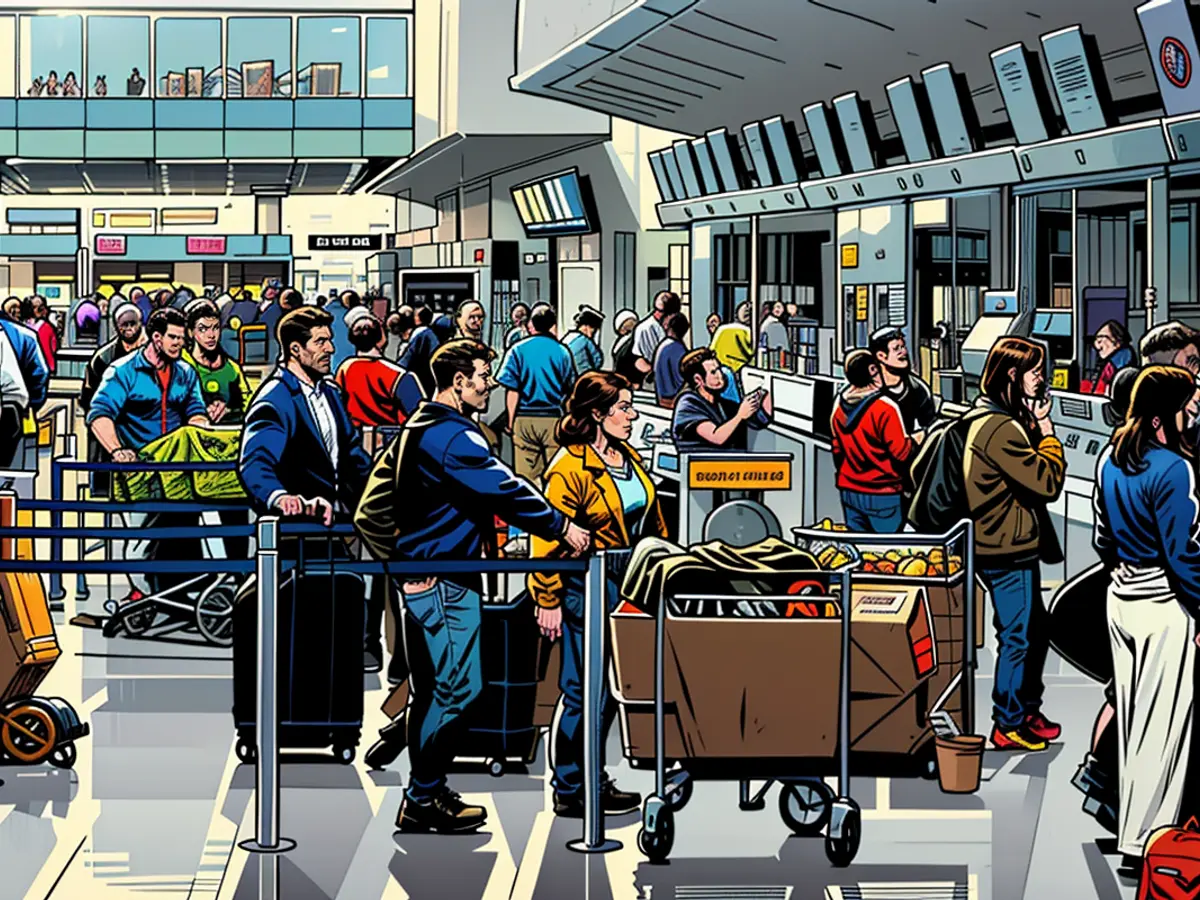check-in - Properly prepared for the airport
Summer, Sun, and Beach attract countless people to Airports throughout the year. Despite being excited about the vacation, most people don't enjoy spending many hours at the airport. Here are some tips to help you start your free days as quickly and calmly as possible.
Packing: Properly prepared for the journey
To avoid being completely exhausted at the airport, it is recommended to pack your luggage and prepare your carry-on items several days before departure. This way, travelers won't forget important items and won't have to search for their passport right before the trip.
The German Aviation Industry Association (BDL) recommends making your luggage stand out - for example, with a luggage tag or stickers. In case the luggage is lost, this can help with identification. Luggage pieces should also be labeled twice - on the outside with a luggage tag and inside, in case the tag detaches. Travelers are strongly advised to keep the luggage tag from the check-in process. This will serve as proof that the luggage was checked in.
Arrival: When should travelers be at the airport?
Travelers are also advised to plan their arrival at the airport well in advance to ensure they arrive on time and with minimal hassle. Those traveling by car can book a parking spot online. Those taking the train can already look up the appropriate connections in advance.
Before starting the journey, travelers can find out about the latest recommendations for arrival and check-in on the websites of the airport, the airline, or the Federal Police. In general, many airlines and airports recommend being at the airport 2 to 2.5 hours before departure - for long-haul flights, 3 hours is often suggested.
Check-in: Relaxed luggage check-in
The BDL emphasizes in its statement that, especially on days when school holidays begin, "more time should be planned for the check-in process and security checks, as longer waiting lines can occur."
Those who want to check in at a counter should carry their passports and travel documents with them in their carry-on items. According to the BDL, time can be saved if travelers have their documents ready as soon as they approach the counter. The association also advises carrying necessary medications and valuables in the carry-on items instead of the luggage.
In many cases, it is worth considering checking in online and using self-service kiosks to check in your luggage. This is often possible even a day before departure. Travelers can print their boarding passes in advance or have them sent to their smartphone. Some airlines offer check-in the day before, which can be particularly convenient for larger families or travel groups, as they won't have to worry about their luggage on the day of departure.
However, Lufthansa notes on its website that mobile boarding passes may not be issued in rare cases due to regulatory requirements. In such cases, passengers will receive a check-in confirmation. The boarding pass will be issued at the counter in these cases.
Due to air safety checks, it is recommended to be at the airport early. The Bundespolice indicate on their website that at Berlin, Bremen, Dresden, Erfurt, Hannover, Hamburg, Leipzig, Saarbrucken and Stuttgart airports, passengers should be at the control point at least 90 minutes before takeoff. At Dusseldorf and Cologne/Bonn airports, it is even recommended to be 120 minutes before takeoff.
Passengers may only bring hand luggage for control and must check in any further luggage, including liquids over 100 milliliters, beforehand. Passengers are allowed to bring a transparent and resealable 1-liter bag with them, in which liquids under 100 milliliters can be placed. The control with security scanners on site - no body images are generated and no data is stored according to the Bundespolice - is voluntary, a manual check is carried out instead.
Pocket contents, wristwatches, and smartphones should be stored in jackets or hand luggage. Suitcases, jackets, the bag, and larger electronic devices such as laptops are then placed in provided luggage carts. The items in the luggage cart are X-rayed. A follow-up check may be necessary, while travelers must maintain a distance. Controllers are allowed to search luggage manually for potentially prohibited items. It may also happen that travelers are asked to demonstrate the functionality of electronic devices.
Prohibited items, which are to be removed from the public area, can be deposited in the car, given to known persons of the travelers, discarded, or, if permitted, checked in as luggage with the airline. Depending on the case, carrying a prohibited item can be an administrative offense or even a criminal offense.
- To ensure a smooth vacation start, the Federal Association of the German Aviation Industry (BDL) suggests labeling your luggage twice for easy identification in case of loss.
- Travelers who enjoy flying should anticipate a relaxed check-in process at the airport, especially during school holidays when longer waiting lines can occur.
- The Federal Police advises arriving at the airport at least 90 minutes before takeoff at certain airports, such as Berlin, Bremen, and Dresden, to account for air safety checks.
- Lufthansa recommends having a physical boarding pass in rare cases where mobile boarding passes are not issued due to regulatory requirements.
- At airport security checks, travelers must put their hand luggage through a scanner, including any liquids over 100 milliliters, which must be stored in a transparent 1-liter bag.
- The Federal Police allows a voluntary control with security scanners at the airport, but manual checks may also be conducted to ensure no prohibited items are present.
- Passengers who bring prohibited items, such as weapons or explosives, may face administrative or even criminal charges, so it's essential to comply with airport security regulations.








